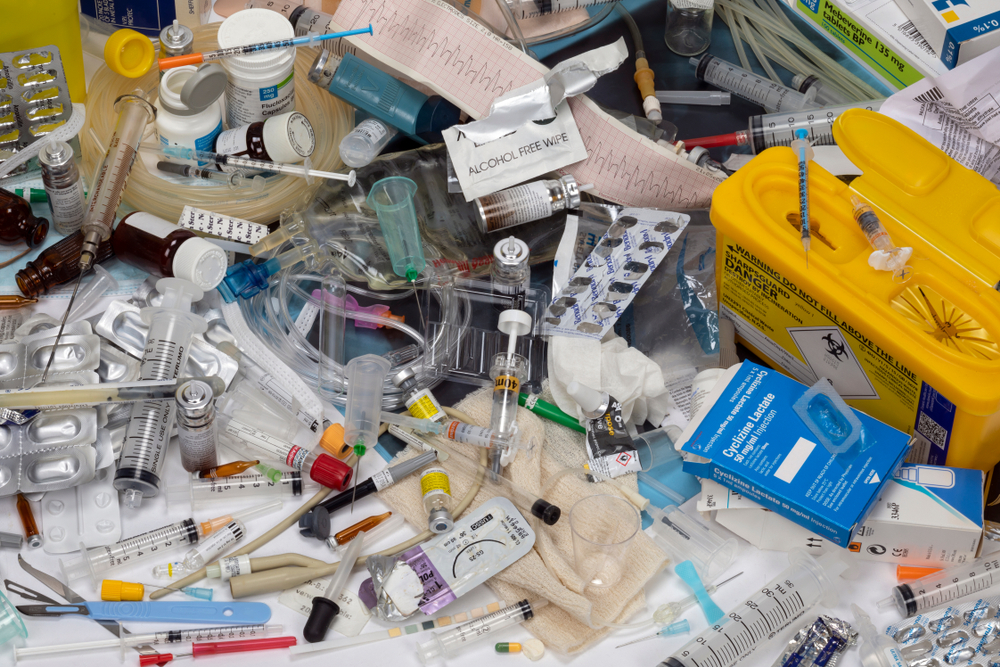Never DIY Your Medical Waste Disposal – If you’re thinking about DIYing your medical waste disposal plan, here are just a few reasons why that could end badly.
With so many rising costs and increasing pressures to cut costs today – it can be tempting to want to save money whenever possible in business. But make no mistakes, there’s no reason to cut corners when it comes to medical waste disposal. If you’re thinking about DIYing your medical waste disposal plan, here are just a few reasons why that could end badly.
Medical waste is dangerous to handle.
One of the most obvious reasons you don’t want to try and DIY this is that medical waste is dangerous to handle. From needle-sticks to infection control—there is so much at risk. Those who work anywhere that medical waste is generated can be exposed. The consequences are far-reaching, from lost productivity to increased insurance premiums for your company/organization.
Medical waste disposal is never as simple as you might hope.
You may think that medical waste disposal is as simple as tossing your used syringes and gauze into a container and calling it a day. But what you don’t know can hurt you—and the people around you and have serious consequences.
The EPA holds strict regulations on how medical waste must be treated and disposed of to prevent the spread of disease. For example, if you’re working with infectious blood or bodily fluids (HIV, hepatitis C, etc.), proper disposal is essential so that no one gets infected.
Even if your facility isn’t regulated by OSHA’s Bloodborne Pathogens Standard or Hazard Communication Standard, it’s still important to know about the medical waste disposal requirements for your business at both the state level—and nationally.
And the EPA takes these regulations very seriously— so it’s not just a matter of compliance; it’s also about avoiding fines – many of which can exceed hundreds of thousands of dollars per incident!
The fines for improper waste handling can be huge.
If you’re caught trying to store, handle or dispose of medical waste in a non-compliant manner, it can cost you a lot of money. The federal government has the right to fine companies that deal with medical waste up to $100,000 per violation. And that’s just the beginning—states also have their own laws governing how medical waste is handled.
The fines are based on the type of waste as well as where it was disposed of and how many people were exposed to it – so there is a lot to lose for trying to DIY it yourself and save a couple bucks.
Medical waste regulations vary from area to area, and you may not be aware of all the regulations in your state. In addition, medical waste disposal laws often change. You can always check with local and state officials to find out whether your current medical waste disposal process is compliant or if it needs to be updated.
You could get sued.
You may be thinking you can DIY your medical waste disposal to cut out the cost of hiring a professional medical waste disposal company, but not only is it illegal to dispose of medical waste on your own, you could end up getting sued if anything goes wrong. For example, if an employee at your business accidentally cuts or pokes themselves with a contaminated needle while disposing of the medical waste, they could sue you for negligence or if someone becomes ill or even dies as a result of their exposure to contaminated waste during your attempt to DIY medical waste disposal, you could be held liable.
Medical waste should always be handled by trained professionals.
Everyone wants to save money when possible, but when it comes to medical waste disposal, the stakes are too high. The proper handling of this type of waste can save lives, while mishandling could result in serious legal consequences or injury to yourself or your staff. We recommend that you never attempt this type of job on your own and always consult a professional before making any decisions about how best to dispose of your business’s medical waste.
You Might Also Like:
- It’s Flu Season: Waste Management Solutions for Vaccines
- What Happens to Medical Waste When It Leaves Your Facility
- What is Cradle to Grave Processing?

Service Areas: Long Island Medical Waste; New York City Medical Waste; Westchester Medical Waste; and more.


